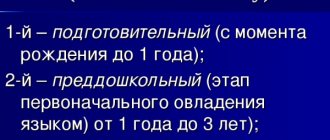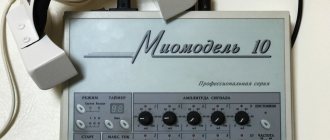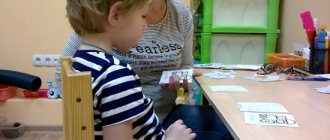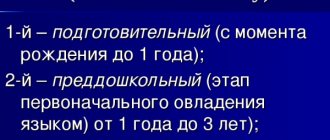It turns out that a child at different periods of life is especially “sensitive”, receptive to a certain type of activity.
It is impossible to influence the timing and duration of these periods, but knowing about them is very useful so as not to go against nature. Moreover, knowing what sensitive period your baby will go through, you can better prepare for it and go through it with maximum benefit. Education, as you know, consists of 90% forethought.
Sensitive periods are most fully and in detail described by the famous teacher Maria Montessori and her followers. Their research describes the nature of development of any child, regardless of his place of residence, nationality, or cultural differences.
On the one hand, sensitive periods are universal, because everyone goes through them one way or another. On the other hand, they are individual, because biological age does not always correspond to psychological age - in some children, psychological development lags behind physical development, in others it is ahead. Therefore, focus only on your own baby.
If a child has to do something under duress, outside the appropriate sensitive period, then they come to the corresponding result later or not at all. Therefore, various methods such as “Read before walking” should be treated with great caution. Nature does not forgive violence against itself.
Sensitive period of speech development: from 0 to 6 years
From 0 to one year
The child imitates sounds and shows a very great interest in speech and emotional communication with adults. At this age, he really wants to talk, but he can’t do it yet. If the baby was deprived of warm emotional contact (primarily with the mother) - for example, like children in orphanages, this, alas, is an irreparable loss, and the entire process of the baby’s further development will be disrupted.
From one to three years
At this age, the baby masters oral speech (it is known that if for some reason he was deprived of human society and human speech, he will never learn to speak normally, like, for example, Mowgli children). With tremendous speed, a child increases his vocabulary - this is the most intensive increase in vocabulary in a person’s life.
This is the period when the baby is most sensitive to language norms. That is why Montessori does not advise adults to coo with the baby; they need to speak to him clearly and clearly - now this is the brightest role model.
Three to six
After three years, the child develops an interest in letters and writing. With great enthusiasm he tries to write this or that letter. And, by the way, not necessarily with pen and paper. Children enjoy laying out letters from sticks and wire, sculpting them from plasticine or writing with their fingers in the sand. At the age of about five years, most children show an interest in reading; at five years old, it is easiest to teach a child to read, as if he is waiting for it.
Oddly enough, learning to read is more difficult than writing. Therefore, Montessori advises approaching reading through writing. After all, writing is an expression of one’s thoughts and desires, and reading is an understanding of other people’s thoughts, solving some “alien” problem.
Briefly about the main thing
- It is important for parents to know at what age a particular sensitive period usually begins and how to determine that it has begun and ended. This will help create an environment that meets your child's developmental needs and is best suited for learning specific skills.
- Age-related sensitivity to order, the development of movements, speech, the perception of small details, the development and clarification of feelings, the development of social norms, etc. begins and ends at different times for each child.
- Attentiveness, competence of parents and willingness to spend a lot of time with the baby are the most important conditions for the development of a child in the most suitable period for this.
- By observing, you can see when and what activities are best to offer your child. It is necessary to rely on activities that interest and captivate the baby the most. To which suddenly there was interest.
- If the period of greatest sensitivity to mastering skills is missed, you need to teach the child gradually. Yes, the process will be slower. However, this does not mean that a person’s opportunity to learn something is completely lost. The question is the speed, complexity of training and the quality of the result.
The material was prepared according to the course of a Montessori teacher and Ph.D. V. N. Mogileva “Sensitive periods of child development”
Photos by Anna Efremova, Maria Luchaninova, Olga Goreva, Tatyana Kharchenko and from our Montessori-
Infographics by Irina Kozina
Sensitive period for the perception of order: from 0 to 3 years
Order for a child is not quite the same as order for an adult. The fact that things are in their places, that clothes are waiting for him every morning, neatly folded on a high chair, that every day follows a certain routine - the baby sees the stability of the world. External order thus turns into internal order.
Sometimes adults believe that children between two and two and a half years old can be unbearably capricious (some even talk about a two-year-old crisis). But it seems that these are not so much whims as a requirement to maintain order. And if this order is violated, it unsettles the little man.
There must be order in everything: in the environment, in time (every day passes in a certain rhythm), in the behavior of adults (they act according to certain rules that do not change depending on mood and weather).
Critical and sensitive periods
The ability of the nervous system to transform under the influence of external factors is transient. And it coincides with a period of more enhanced morphofunctional maturation, which can be explained by the phenomenon of age-related sensitivity to environmental influences, with which sensitive and critical stages of development are interconnected.
Each of the stages has a number of characteristic features, although their basis is a temporary increase in sensitivity to certain external influences. Characteristic features: level of selectivity to perception, time schedule, consequences of inadequate implementation, reversibility of outcomes.
Initially, the concept of a critical period was used in embryology to designate periods of time that are characterized by high sensitivity to the influence of factors that go beyond physiological norms.
During the period of intrauterine formation, in its clearly defined stages, each organ undergoes certain critical phases of differentiation.
A critical period should be called a period when the body must feel normative influences, and this will be a condition for its future full development. All transformations that occur during the critical phase are characterized by irreversibility, as a result of which the function and structure acquire a complete form, which becomes insensitive to modifying influences at a later age. Critical phases are more typical for anatomical and morphological transformations in the process of formation. Since they are associated with a specific stage of morphological development, they may represent chronological symmetry of development.
The concept sensitive denotes a period of time characterized by a certain set of stimuli that have a greater impact on the formation of functions than before or after. In fact, such a period is considered as more favorable for development. In other words, the critical period means action “now or never,” and the sensitive period means “it’s possible at another time, but it’s better now.”
Sensitive and critical periods determine the mechanism of individualization of formation, since depending on the implementation of a certain period, subsequent stages can receive an increasingly more characteristic experience, characteristic only of a given subject.
Due to the fact that the individuality of the subject at the entire stage of ontogenetic development is holistic, we can conclude that crises are systemic in nature and “include” significant physiological transformations as an invisible force.
Sensitive period for sensory development: from 0 to 5.5 years
At this age, the ability to see, hear, smell, taste, etc. is trained. This, of course, happens naturally, but for more intense sensory development M. Montessori recommends special exercises: for example, with your eyes closed, determine the taste, smell, size.
The child should have as many sensory impressions as possible. And for this it is not at all necessary to take the baby to the theater or to a symphony music concert every day. You can, for example, guess how various household items sound (listen, for example, to how a glass rings when you lightly tap it with a chopstick or spoon, and how an iron pan or a wooden table will behave in the same situation).
Children at this age (and adults too) really like the game “Magic Bag”. A variety of small objects are placed in a bag made of opaque fabric: scraps of various fabrics (from chiffon to tarpaulin), figures made of wood, plastic, metal, pieces of paper (from tissue paper to sandpaper), etc., and then we determine by touch what managed to find it in the bag.
Sensitive period for the perception of small objects: from 1.5 to 5.5 years
Adults are horrified to see how little children manipulate peas or small buttons. Especially when they are trying to figure out whether said objects will fit in the ear or nose. Of course, such games should only be played under adult supervision.
But this is a completely natural interest that stimulates the development of fine motor skills of the fingers, the benefits of which cannot be doubted. Therefore, take care to make handling small objects safe. For example, buttons can be strung on a strong thread to create original beads that will keep your baby occupied for a long time. Together with you, he can take a long time to disassemble and reassemble the construction set with small parts. This activity helps to solve the problem of the whole and the part for the baby.
M. Montessori even advised creating special collections of small objects.
What to do if windows of opportunity have already closed
If sensitive periods have already been missed, we will not be able to return them. Therefore, we can only come to terms with the fact that there was no knowledge and we could not pay attention to what was important in the development of our baby.
But don’t despair or blame yourself, children are not so fragile - they are flexible, strong and resilient. Take a closer look, because right now the child is demonstrating his new interest. Therefore, you can focus on providing as many opportunities as possible to meet current needs.
Missed skills can be taught gradually. Conflicts have begun with your preschooler regarding order - you will have to be patient and constantly remind the child of the need to clean up after himself. If you missed the crawling stage, you can make up for it by playing in mazes or rock climbing. This will not cause much joy or interest for the child; he will need to make more efforts, but he will learn the skills. Although not as ideal as in the sensitive period.
In the article, we examined in detail what sensitive periods are and how knowledge about them helps create better conditions for the development of children. A child will never have such favorable opportunities for mastering new skills as during these periods - after all, all the needs of physical and mental development are concentrated in them. If we miss them, they are gone forever.
When we see the needs of our baby, respond to them and improve the environment, then whims, hysterics and whining go away. The time has come for positive emotions: joy, pride from success, passion. We do not encounter problems or difficulties. After all, now our child is busy with really important activities, which he is interested in at the peak of his receptivity.
Sensitive period of movements and actions: from 1 to 4 years
An extremely important activity for a baby. Thanks to the movement, the blood is saturated with oxygen, and the oxygenated blood supplies the brain cells that are involved in the development of all mental functions. And therefore, any class-lesson system, long lessons at desks for children at this age is simply a crime against their nature.
Every year the child improves the coordination of his movements, masters new actions and learns to sense his body more and more accurately. Help him with this! Running, jumping on one leg, climbing ladders and balancing on a log are activities no less important than learning to write and count.
Sensitive periods of physical development
The formation of movements in children occurs in a prescribed sequence. In order to perform any movement, you need to show certain physical qualities, have speed and dexterity, and expend some strength. Therefore, along with the development of the main movements, the formation of physical qualities also occurs. The degree of development of physical qualities determines the quality and quantity of movements that the baby has.
Physical qualities are characterized by uneven development at different periods of children's lives. At one time, certain qualities are formed equally quickly and synchronously, at another time the qualities grow with varying strength. The stages in which a particular quality is most strongly formed are called sensitive.
Sensitive periods of abilities and the sensitive stage of the formation of physical development last from approximately one year to four years. Thanks to the movements, which are accompanied by intensive ventilation of the children's lungs, the blood is saturated with oxygen in sufficient quantities to feed the brain cells involved in the formation of mental functions.
The course of this period is not always uniform and is characterized by moments when the baby focuses his attention on specific actions or movements. At the beginning of this sensitive period, children are only interested in movement, and later they are interested in more difficult actions, in order to perform them, kids need to have a certain degree of coordination, expressiveness and freedom of movement.
Dexterity, speed, dynamic and static strength - physical qualities and functional motor skills, such as coordination and orientation abilities, differentiation of spatial characteristics and power stresses, are moderately formed at the age of five years. Also during this period, two main movements develop - jump and balance.
At the age of six years, there is a moderate increase in the formation of three qualities, such as flexibility, endurance and speed strength, and two inclinations, such as the differentiation of spatial characteristics and orientation abilities. The development of the following important movements occurs more rapidly: throwing, walking, movements of the legs and arms.
Sensitive periods of abilities and the growth of two abilities - differentiation of power tension and coordination abilities determine the seventh year of life. This stage is also characterized by moderate, accelerated development of flexibility and dexterity, moderate development of such basic movements as running, walking, throwing, jumping, leg and arm movements.
The sensitive period of preschool age is also characterized by the development of non-verbal memory, namely motor memory, which plays an important role in controlling movements.
The period of early childhood is the age when the formation of needs for vigorous motor activity occurs and the mechanisms for the formation of all the abilities of children are launched. If you miss this period, then later it will be either impossible or quite difficult to catch up. That is why health and correctional work on physiological education is so important.
Children's motor activity at an early age requires a varied approach, which, first of all, consists of teaching local movements (movements of body parts), combinations of body movements, integral movements - body movements. Local movements and combinations of movements can be taught using developmental exercises. Holistic movements are jumping, walking, throwing and running.
In the process of teaching children basic movements, one should purposefully influence the formation of such physical qualities as strength, speed, agility, etc. Success in mastering skills and abilities that are important for life is determined by the degree of development of physical qualities.
The sensual, mental and emotional areas are formed in the course of nurturing the physical qualities listed above. This is why the physical education of a child is so important. Physical education is considered the first step in education in general.
The age of children from seven to ten years, regardless of their morphofunctional appearance, is characterized by a fairly high level of sensitivity to the influence of physical activity and the largest number of stages with the highest natural growth of motor qualities. And the period from ten years to thirteen is characterized by the smallest number of such stages.
Sensitive period for the development of social skills: from 2.5 to 6 years
At this age, the child learns cultural forms of communication - what will later be called etiquette.
Until the age of six, the foundations of social behavior are laid; the child absorbs, like a sponge, examples of both rude and polite ways of communicating with the world. The ability to imitate is mainly at work here. Therefore, try to behave the way you think your child should behave.
Inessa Smyk
Based on materials from the book “Help me do it myself” by M. Montessori, M., 2000
Sources
- Yu Y., Yang X., Wang S., Wang H., Chang R., Tsamlag L., Zhang S., Xu C., Yu X., Cai Y., Lau JTF. Serial multiple mediation of the association between internet gaming disorder and suicidal ideation by insomnia and depression in adolescents in Shanghai, China. // BMC Psychiatry - 2022 - Vol20 - N1 - p.460; PMID:32967648
- Macari S., Milgramm A., Reed J., Shic F., Powell KK., Macris D., Chawarska K. Context-Specific Dyadic Attention Vulnerabilities During the First Year in Infants Later Developing Autism Spectrum Disorder. // J Am Acad Child Adolesc Psychiatry - 2022 - Vol60 - N1 - p.166-175; PMID:32061926
- Carson V., Kuzik N. Demographic correlates of screen time and objectively measured sedentary time and physical activity among toddlers: a cross-sectional study. // BMC Public Health - 2022 - Vol17 - N1 - p.187; PMID:28193271
- Radesky JS., Silverstein M., Zuckerman B., Christakis DA. Infant self-regulation and early childhood media exposure. // Pediatrics - 2014 - Vol133 - N5 - p.e1172-8; PMID:24733868







